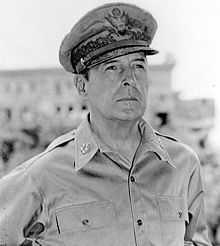Six-star rank

A six-star rank was a proposed special grade immediately superior to a five-star rank. After the United States Military ranks of General of the Army and Fleet Admiral had been established in the 1940s, a proposal was made for promoting one of the generals to the superior rank of General of the Armies of the United States, while reserving John J. Pershing's seniority in that rank, and another proposal for promoting one of the admirals to the superior rank of Admiral of the Navy.
US armed forces
Army
On 21 January, 1955, the US Senate considered a joint resolution "To authorize the appointment of General of the Army Douglas MacArthur as "General of the Armies of the United States". The resolution stated that this was "in recognition of the great services to his country" he had rendered, and that "the President is hereby authorized to appoint General of the Army Douglas MacArthur to the office of General of the Armies of the United States (which office is hereby revived for this purpose), such appointment to take effect as of the seventy-fifth anniversary of his birth, January 26, 1955."[2] The proposal was shelved and never took effect.[3][4][5]
George Washington was posthumously promoted to the rank of "General of the Armies of the United States" in 1976.[6] Although the law did not actually specify the number of stars,[7] some U.S. newspapers[8][9][10] and Congressional politicians[11] describe this as a six-star rank. His appointment had been to serve as "General and Commander in chief of the Army of the united Colonies".[12][13]
Navy
The Department of the Navy specified that the new Fleet Admiral rank was to be junior to the rank of Admiral of the Navy, which had been held uniquely by George Dewey (died 1917). The Navy Department's proposal, when preparing the invasion of Japan, for promoting Fleet Admiral Chester W. Nimitz to Admiral of the Navy lapsed after the Japanese surrender.
-

George Dewey (d.1917) in full dress uniform as Admiral of the Navy
-

General of the Armies four star insignia chosen by John J. Pershing in 1919
-

General Douglas MacArthur showing five-star rank insignia. A proposal in Congress (1955) that MacArthur be promoted to General of the Armies lapsed
-

Order for promoting Douglas MacArthur to General of the Armies. Copy taken from his service record on file at the National Personnel Records Center
-

Painting of George Washington showing three star insignia. He was posthumously promoted to the rank of General of the Armies of the United States in 1976
-

s:Order 31-3 for promoting George Washington to the rank of General of the Armies of the United States effective 4 July, 1976
References
- ↑ Private correspondence from United States Army Institute of Heraldry, see Wikipedia talk page discussion
- ↑ US Senate Joint Resolution 26, 21 January 1955.
- ↑ Foster, Frank C. (2011). United States Army Medal, Badges and Insignias. Medals of America Press. p. 19. ISBN 9781884452673.
effort was made to reward General Douglas MacArthur, this time with specifying a six-star rank, but it never came to fruition
- ↑ Weintraub, Stanley (2007). 15 Stars: Eisenhower, MacArthur, Marshall: Three Generals Who Saved the American Century. Simon & Schuster. p. 488. ISBN 9781416545934.
A few MacArthur devotees in Congress, like Representative Martin, tried to organize support for honorary six-star rank for the general, but as that would have been a slap at Eisenhower, such legislation had no chance.
- ↑ Korda, Michael (2009). Ike. HarperCollins. p. 190. ISBN 9780061744969.
Congress would twice try to promote him from the new rank of General of the Army—a five-star general—to the unique rank of General of the Armies: a proposed six-star general.
- ↑ Department of the Army Order 31-3, (13 March 1978). Department of the Army order to enact Public Law 94-479.
- ↑ Dooley, Joseph (April 6, 2013). "Sunday Reflection: How the 'indispensable man' became America's only six-star general". Washington Examiner.
- ↑ United Press International (October 12, 1976). "George Washington Wins Promotion to Six-Star Rank". Eugene Register-Guard (Eugene, Oregon). p. 7A. Retrieved March 1, 2014.
- ↑ "Washington Gets Star". The New York Times. October 13, 1976.
President Ford signed today a bill that posthumously promoted George Washington to the rank of six-star General of the Armies
- ↑ Kilian, Michael (August 5, 1976). "Foursquare opposed to a six-star Washington". Chicago Tribune. p. A2.
- ↑ Dooley, Joseph (April 6, 2013). "Sunday Reflection: How the 'indispensable man' became America's only six-star general". Washington Examiner.
Rep. Frank Wolf, R-Va., ... noted, [Washington] is "the only six-star general in the nation's history."
- ↑ Cont'l Cong., Commission for General Washington, in 2 Journals of the Continental Congress, 1774-1789 96-7 (Library of Cong. eds., 1905).
- ↑ Cont'l Cong., Instructions for General Washington, in 2 Journals of the Continental Congress, 1774-1789 100-1 (Library of Cong. eds., 1905).
See also
| ||||||||||||||